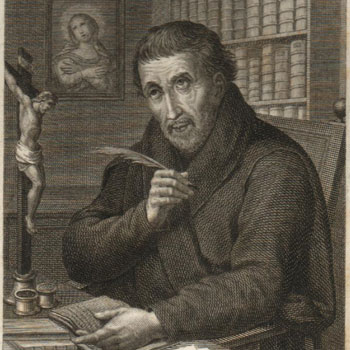St Peter Canisius, born on May 8, 1521, in Nijmegen (now part of the Netherlands), shared his birthday with a significant event in Christian history. Martin Luther was placed under ban by the ‘Edict of Worms’, marking the formal start of the Protestant Reformation. Biographers often highlight this coincidence, noting how St Peter would become a key figure in the Catholic Counter-Reformation in Germany and Switzerland.
In his youth, Peter admitted to being troublesome but showed early signs of his vocation, often ‘playing priest’. At fifteen, he began seeking spiritual direction from Fr Nicholas, confessing his daily faults with openness and a desire for guidance, a practice that laid the foundation for his spiritual growth.
On his 22nd birthday, during a retreat led by Bl. Peter Faber, one of the first Jesuits, Peter vowed to join the newly founded Society of Jesus. He soon entered the novitiate and was ordained a priest on June 12, 1546, in Cologne.
In 1549, he embarked on a 30-year mission in Germany, the focus of his life’s work. Pope Leo XIII, in his 1897 encyclical Militantis Ecclesiae, referred to St Peter Canisius as “the second apostle of Germany after St Boniface.” Among his significant contributions was his influence on Pope Gregory XIII, known as “the Pope of the Seminaries.” St Peter’s efforts helped establish seminaries, a cornerstone of the Counter-Reformation, and shaped many pivotal events, such as preventing Emperor Ferdinand from derailing the Council of Trent.
At 59, considered elderly at the time, St Peter went to Fribourg, Switzerland, to found a college. He also played a leading role in establishing the University there, where he spent the last 17 years of his life. His work revitalised the Catholic faith in Switzerland, prompting Pope Benedict XV in 1921 to declare, “If the Swiss have kept the Catholic Faith, after God, it must be attributed especially to the watchfulness and wisdom of this holy man.” Above his portrait in Fribourg’s Church of St Nicholas are inscribed the words: Patriarch of Catholic Switzerland.
By the time he left Germany in 1580, he had helped grow the Jesuits in the region from three members to over 1100. St Peter’s remarkable versatility saw him serve as teacher, preacher, legate, administrator, confessor, and visitor of the sick and poor. He was also a prolific writer, with his letters meticulously preserved. His devotional works include the Manual for Catholics and the renowned Opus Marianum, a testament to his deep devotion to the Virgin Mary.
Catechisms
His Catechisms, written for adults, children, and intermediate learners, became synonymous with Catholic teaching in parts of Germany. His large catechism, the Summa of Christian Doctrine, replaced an abandoned theological manual and became one of the most successful summaries of Christian teaching, noted for its simplicity and clarity. Within 130 years, it had been published in nearly 400 editions worldwide.
St Peter Canisius was deeply united to God through prayer and meditation, often moved to tears or ecstasy. He died on December 21, 1597, aged 77. Beatified by Pope Pius IX, he was canonised and declared a Doctor of the Universal Church by Pope Pius XI in 1925. His unwavering devotion to the Blessed Virgin Mary was a cornerstone of his success in combating heresy and strengthening the Church.


 Renata Milán Morales
Renata Milán Morales